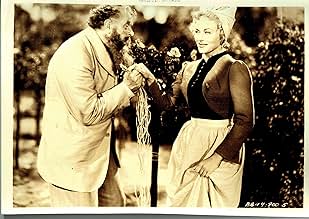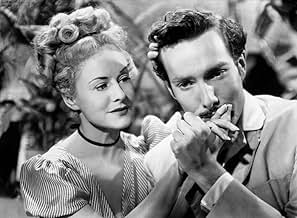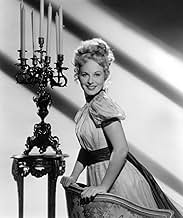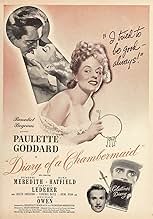Le journal d'une femme de chambre
Titre original : The Diary of a Chambermaid
- 1946
- Tous publics
- 1h 26min
NOTE IMDb
6,5/10
1,6 k
MA NOTE
Ajouter une intrigue dans votre langueA chambermaid plots to climb the social ladder by marrying a wealthy man.A chambermaid plots to climb the social ladder by marrying a wealthy man.A chambermaid plots to climb the social ladder by marrying a wealthy man.
- Réalisation
- Scénario
- Casting principal
- Récompenses
- 1 victoire au total
Edward Astran
- Townsman
- (non crédité)
Arthur Berkeley
- Townsman
- (non crédité)
Chet Brandenburg
- Townsman
- (non crédité)
Egon Brecher
- The Postman
- (non crédité)
Jane Crowley
- Townswoman
- (non crédité)
Sumner Getchell
- Pierre
- (non crédité)
Jack Perry
- Townsman
- (non crédité)
Joe Ploski
- Townsman
- (non crédité)
Avis à la une
France's most famous director, Jean Renoir, had to go to America to make his film of French author Octave Mirbeau's novel "The Diary of a Chambermaid". It was adapted for the screen by the actor Burgess Meredith, mainly as a vehicle for his then wife Paulette Goddard who plays the chambermaid Celestine who uses her wiles on the various men in the household where she is employed. It's a lovely performance in a film full of good performances. Others in the cast include Meredith himself, Hurd Hatfield, Reginald Owen and Judith Andereson but it's Francis Lederer as the malevolent manservant Joseph who walks off with the movie.
It's really a film of two halves. The early farcial elements seem overworked, (I know it's a film about eccentrics but such broad strokes hardly suit Renoir). However, the darkness that overwhelms the second half of the picture is magnificently handled by the director and is actually quite shocking. This is a very different film from the one Bunuel made in 1964 and perhaps all the better for it.
It's really a film of two halves. The early farcial elements seem overworked, (I know it's a film about eccentrics but such broad strokes hardly suit Renoir). However, the darkness that overwhelms the second half of the picture is magnificently handled by the director and is actually quite shocking. This is a very different film from the one Bunuel made in 1964 and perhaps all the better for it.
As Paulette Goddard plies her "magic," things don't always go as planned. She is a gold digger and doesn't hesitate to settle for less attractive if there is money on the way. What happens is a series of abutments that hold up the process. For me the charm of he movie was the use of some great character actors. A young Burgess Meredith and Irene Ryan. It's one of those films that is ultimately forgettable but has some nice moments.
A double-bill of two films transmuting Octave Mirbeau's source novel LE JOURNAL D'UNE FEMME DE CHAMBRE onto the celluloid, made by two cinematic titans: Jean Renoir and Luis Buñuel, 18 years apart.
Renoir's version is made in 1946 during his Hollywood spell, starring Paulette Goddard as our heroine Celestine, a Parisian girl arrives in the rural Lanlaire mansion to work as the chambermaid in 1885, barely alighting from the train, Celestine has already been rebuffed by the haughty valet Joseph (an excellently surly Lederer), and confides to the also newly arrived scullery maid Louise (a mousy and dowdy Irene Ryan) that she will do whatever in her power to advancing her social position and firmly proclaims that love is absolutely off limits, and the film uses the literal diary- writing sequences as a recurrent motif to trace Celestine's inner thoughts.
The objects of her tease are Captain Lanlaire (Owen), the patriarch who has relinquished his monetary sovereignty to his wife (Judith Anderson, emanating a tangy air of gentility and callousness); and Captain Mauger (a comical Burgess Meredith, who also pens the screenplay off his own bat), the Lanlaire's goofy neighbor who has a florae-wolfing proclivity and is perennially at loggerheads with the former on grounds of the discrepancy in their political slants, both are caricatured as lecherous old geezers with the death of a pet squirrel prefiguring the less jaunty denouement.
In Renoir's book, the story has a central belle-époque sickly romantic sophistication to sabotage Celestine's materialistic pursuit, here her love interest is George (Hurd Hatfield), the infirm son of the Lanlaire family, a defeatist borne out of upper-crust comfort and has no self-assurance to hazard a courtship to the one he hankers after. Only when Joseph, a proletariat like Celestine, turns murderous and betrays his rapacious nature, and foists a hapless Celestine into going away with him, is George spurred into action, but he is physically no match of Joseph, only with the succor from the plebeian mob on the Bastille Day, Celestine is whisked out of harm's way, the entire process is shrouded by a jocose and melodramatic state of exigency and Renoir makes ascertain that its impact is wholesome and wonderfully eye-pleasing.
In paralleled with Buñuel's interpretation of the story, Renoir has his innate affinity towards the aristocracy (however ludicrous and enfeebled are those peopled) and its paraphernalia, the story is less lurid and occasionally gets off on a comedic bent through Goddard's vibrant performance juggling between a social-climber and a damsel-in-distress.
The same adjective "comedic", "vibrant" certainly doesn't pertain to Buñuel's version, here the time-line has been relocated to the mid-1930s, Celestine (played by Jeanne Moreau with toothsome reticence and ambivalence) more often than not, keeps her own counsel, we don't even once see her writing on the titular diary, she works for Mr. and Mrs Monteil (Piccoli and Lugagne), who are childless but live with Madame's father Mr. Rabour (Ozenne, decorous in his condescending aloofness), an aristo secretly revels in boots fetish in spite of his dotage. Here the bourgeois combo is composed of a frigid and niggardly wife, a sexed-up and henpecked husband (Mr. Piccoli makes for a particularly farcical womanizer, armed with the same pick-up line), a seemingly genteel but kinky father, and Captain Mauger (Ivernel), here is less cartoonish but no less uppity, objectionable and erratic; whereas Joseph (Géret), is a rightist, anti-Semitic groom whose perversion is to a great extent much more obscene (rape, mutilation and pedophilia are not for those fainted hearts).
Amongst those anathemas, Celestine must put on her poker face, or sometimes even a bored face to be pliant (she even acquiesces to be called as Marie which Goddard thinks better of in Renoir's movie), she is apparently stand-offish but covertly rebellious, and when a heinous crime occurs (a Red Riding Hood tale garnished with snails), she instinctively decides to seek justice and tries insinuating her way into a confession from the suspect through her corporeal submission, only the perpetrator is not a dolt either, unlike Renoir's Joseph, he knows what is at stakes and knows when to jettison his prey and start anew, that is a quite disturbing finale if one is not familiar with an ending where a murderer gets away with his grisly crime. But Buñuel cunningly precedes the ending with a close-up of a contemplating Celestine, after she finally earns her breakfast-in-bed privilege, it could suggest that what followed is derived from her fantasy, which can dodge the bullet if there must be.
Brandishing his implacable anti-bourgeoisie flag, Buñuel thoughtfully blunts his surrealistic abandon to give more room for dramaturgy and logical equilibrium, which commendably conjures up an astringent satire laying into the depravity and inhumanity of the privileged but also doesn't mince words in asserting that it doesn't live and die with them, original sin is immanent, one just cannot be too watchful.
Last but definitely not the least, R.I.P. the one and only Ms. Moreau, who just passed away at the age of 89, and in this film she is a formidable heroine, brave, sultry and immune to all the mushy sentiments, whose fierce, inscrutable look is more than a reflection of her temperaments, but a riveting affidavit of a bygone era's defining feature.
Renoir's version is made in 1946 during his Hollywood spell, starring Paulette Goddard as our heroine Celestine, a Parisian girl arrives in the rural Lanlaire mansion to work as the chambermaid in 1885, barely alighting from the train, Celestine has already been rebuffed by the haughty valet Joseph (an excellently surly Lederer), and confides to the also newly arrived scullery maid Louise (a mousy and dowdy Irene Ryan) that she will do whatever in her power to advancing her social position and firmly proclaims that love is absolutely off limits, and the film uses the literal diary- writing sequences as a recurrent motif to trace Celestine's inner thoughts.
The objects of her tease are Captain Lanlaire (Owen), the patriarch who has relinquished his monetary sovereignty to his wife (Judith Anderson, emanating a tangy air of gentility and callousness); and Captain Mauger (a comical Burgess Meredith, who also pens the screenplay off his own bat), the Lanlaire's goofy neighbor who has a florae-wolfing proclivity and is perennially at loggerheads with the former on grounds of the discrepancy in their political slants, both are caricatured as lecherous old geezers with the death of a pet squirrel prefiguring the less jaunty denouement.
In Renoir's book, the story has a central belle-époque sickly romantic sophistication to sabotage Celestine's materialistic pursuit, here her love interest is George (Hurd Hatfield), the infirm son of the Lanlaire family, a defeatist borne out of upper-crust comfort and has no self-assurance to hazard a courtship to the one he hankers after. Only when Joseph, a proletariat like Celestine, turns murderous and betrays his rapacious nature, and foists a hapless Celestine into going away with him, is George spurred into action, but he is physically no match of Joseph, only with the succor from the plebeian mob on the Bastille Day, Celestine is whisked out of harm's way, the entire process is shrouded by a jocose and melodramatic state of exigency and Renoir makes ascertain that its impact is wholesome and wonderfully eye-pleasing.
In paralleled with Buñuel's interpretation of the story, Renoir has his innate affinity towards the aristocracy (however ludicrous and enfeebled are those peopled) and its paraphernalia, the story is less lurid and occasionally gets off on a comedic bent through Goddard's vibrant performance juggling between a social-climber and a damsel-in-distress.
The same adjective "comedic", "vibrant" certainly doesn't pertain to Buñuel's version, here the time-line has been relocated to the mid-1930s, Celestine (played by Jeanne Moreau with toothsome reticence and ambivalence) more often than not, keeps her own counsel, we don't even once see her writing on the titular diary, she works for Mr. and Mrs Monteil (Piccoli and Lugagne), who are childless but live with Madame's father Mr. Rabour (Ozenne, decorous in his condescending aloofness), an aristo secretly revels in boots fetish in spite of his dotage. Here the bourgeois combo is composed of a frigid and niggardly wife, a sexed-up and henpecked husband (Mr. Piccoli makes for a particularly farcical womanizer, armed with the same pick-up line), a seemingly genteel but kinky father, and Captain Mauger (Ivernel), here is less cartoonish but no less uppity, objectionable and erratic; whereas Joseph (Géret), is a rightist, anti-Semitic groom whose perversion is to a great extent much more obscene (rape, mutilation and pedophilia are not for those fainted hearts).
Amongst those anathemas, Celestine must put on her poker face, or sometimes even a bored face to be pliant (she even acquiesces to be called as Marie which Goddard thinks better of in Renoir's movie), she is apparently stand-offish but covertly rebellious, and when a heinous crime occurs (a Red Riding Hood tale garnished with snails), she instinctively decides to seek justice and tries insinuating her way into a confession from the suspect through her corporeal submission, only the perpetrator is not a dolt either, unlike Renoir's Joseph, he knows what is at stakes and knows when to jettison his prey and start anew, that is a quite disturbing finale if one is not familiar with an ending where a murderer gets away with his grisly crime. But Buñuel cunningly precedes the ending with a close-up of a contemplating Celestine, after she finally earns her breakfast-in-bed privilege, it could suggest that what followed is derived from her fantasy, which can dodge the bullet if there must be.
Brandishing his implacable anti-bourgeoisie flag, Buñuel thoughtfully blunts his surrealistic abandon to give more room for dramaturgy and logical equilibrium, which commendably conjures up an astringent satire laying into the depravity and inhumanity of the privileged but also doesn't mince words in asserting that it doesn't live and die with them, original sin is immanent, one just cannot be too watchful.
Last but definitely not the least, R.I.P. the one and only Ms. Moreau, who just passed away at the age of 89, and in this film she is a formidable heroine, brave, sultry and immune to all the mushy sentiments, whose fierce, inscrutable look is more than a reflection of her temperaments, but a riveting affidavit of a bygone era's defining feature.
I cannot pretend to explain all the allusions and metaphors Renoir intended to convey with this impressionistic comedy. Paulette Goddard, as the main character, is magnificent. She conveys her feelings and thoughts through her diary, but in a manner that is always blurry and full of confusion. And speaking of confusion, Hurd Hatfield is on hand as the scion of the odd home. Burgess Meredith, Francis Lederer, and Irene Ryan all add terrific seriocomic support in their roles.
Be prepared to experience many conflicting feelings while viewing this film.
Be prepared to experience many conflicting feelings while viewing this film.
"Life is life. From now on I'm going to fight, and I'm going to fight hard, and I don't care who gets hurt, just so as it's not me."
"Don't be afraid of me. You and I are alike, maybe not in looks, but underneath we are the same."
"How does it feel to be in love?
"Plans can get you into trouble."
"We are not used to kissing in public.
"Where are you going?
"The more I'm beaten, the stronger I get."
"Don't be afraid of me. You and I are alike, maybe not in looks, but underneath we are the same."
"How does it feel to be in love?
- It changes all the time."
"Plans can get you into trouble."
"We are not used to kissing in public.
- Not in public. Are you ashamed? You shouldn't be ashamed of love. You should be proud. Take him in your arms, hold him, kiss him, embrace him!"
"Where are you going?
- Flying to the moon." 😂
"The more I'm beaten, the stronger I get."
Le saviez-vous
- AnecdotesWhile wrongly billed as Renoir's last American film (there were several later films of note, including The Woman on the Beach), this pleasant film is a far cry from his early masterpieces - like Rules of The Game, The Grand illusion and The Crime of M. Lang. It's primarily notable for the small things it reveals after close examination. Paulette Goddard, in her mid-30s at the time, still manages to show the smiling presence and nuanced emotions that so charmed Charlie Chaplin; at one point, stumbling while she tries to balance a tray with a cake on it, she makes moves that are pure Chaplin. The cast is a study in the history of filmmaking: Dame Judith Anderson, whose credits range from Rebecca to Star Trek III (and once toured with a theater company performing the lead role in Hamlet); Irene Ryan would achieve fame decades later as one of the stars of The Beverly Hillbillies; and Burgess Meredith - who co-produced and co-wrote - played in hundreds of films and television productions, from the original 1939 Of Mice and Men through Rocky I, II, III, and V.
- GaffesWhen the Captain (Meredith) is going to the July 14 celebration, the shadow of the boom and mic are visible.
- Citations
Georges Lanlaire: I never found the urge to live or die on a big scale.
- ConnexionsReferenced in Tiovivo c. 1950 (2004)
Meilleurs choix
Connectez-vous pour évaluer et suivre la liste de favoris afin de recevoir des recommandations personnalisées
- How long is The Diary of a Chambermaid?Alimenté par Alexa
Détails
- Durée1 heure 26 minutes
- Couleur
- Rapport de forme
- 1.37 : 1
Contribuer à cette page
Suggérer une modification ou ajouter du contenu manquant

Lacune principale
By what name was Le journal d'une femme de chambre (1946) officially released in India in English?
Répondre
































